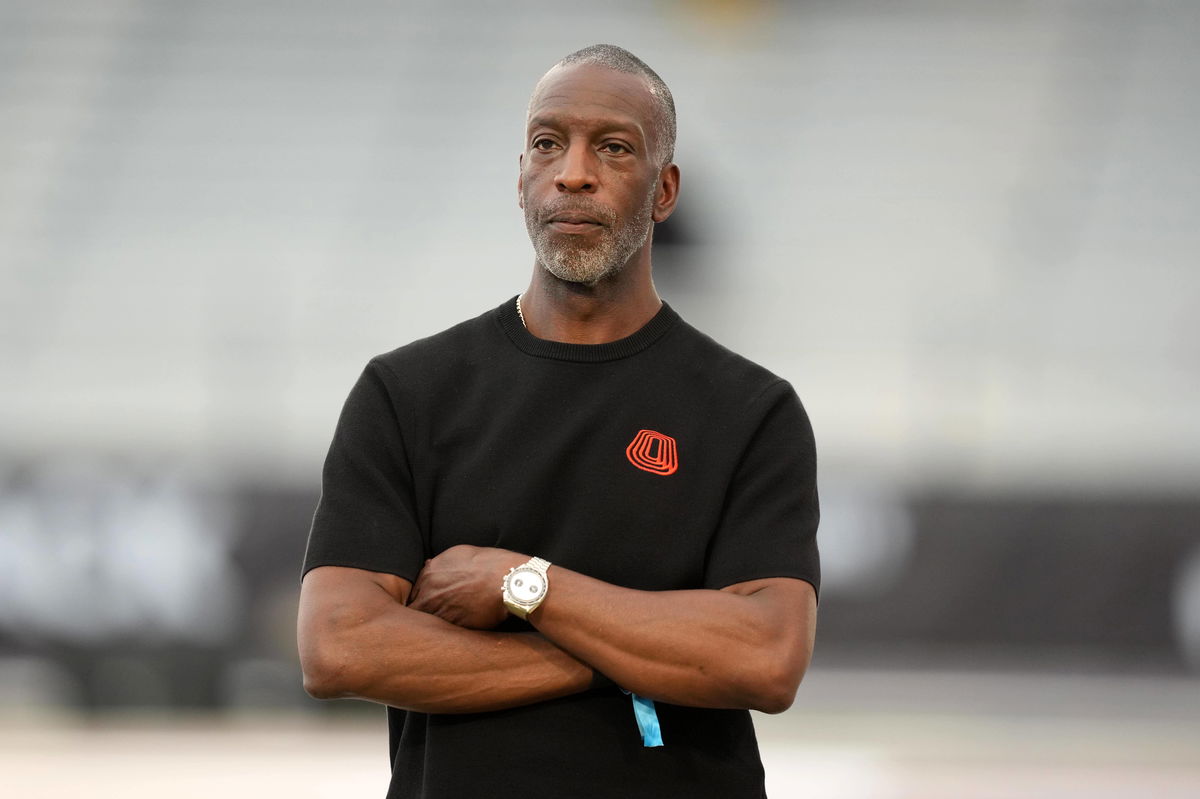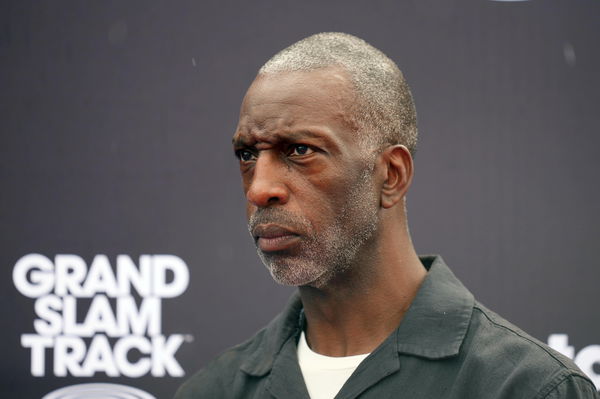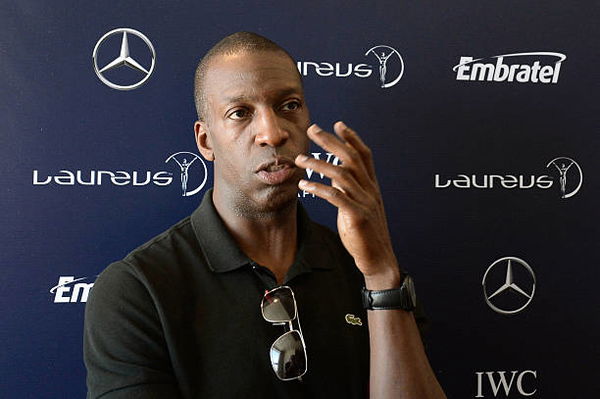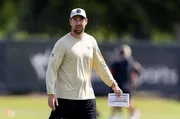
Imago
Track & Field: Grand Slam Track Miami May 3, 2025 Miramar, FL, USA Michael Johnson at the Grand Slam Track Miami at Ansin Sports Complex. Miramar Ansin Sports Complex Florida United States, EDITORIAL USE ONLY PUBLICATIONxINxGERxSUIxAUTxONLY Copyright: xKirbyxLeex 20250503_szo_al2_0116

Imago
Track & Field: Grand Slam Track Miami May 3, 2025 Miramar, FL, USA Michael Johnson at the Grand Slam Track Miami at Ansin Sports Complex. Miramar Ansin Sports Complex Florida United States, EDITORIAL USE ONLY PUBLICATIONxINxGERxSUIxAUTxONLY Copyright: xKirbyxLeex 20250503_szo_al2_0116
“I love this sport,” Michael Johnson told the BBC on Wednesday, November 27. He further added, “Grand Slam Track is track, that is what we’re doing. I am going to save what I think I can save; I think I can save track, I don’t think I can save track and field.” But then, the dreams of the legend were shattered!
Watch What’s Trending Now!
Johnson launched his Grand Slam Track series with precisely that ambition. To reinvent how athletics were staged and consumed. But the project collapsed within a single season. The scheduled finale in Los Angeles never took place. Instead, the initiative unraveled into a tangle of broken promises, delayed prize money, and unpaid appearance fees, with more than $13 million still owed to athletes and vendors. And now, for the four-time Olympic champion, the failure has moved beyond the sporting arena and into his professional reputation.
The BBC has confirmed that Johnson will not feature as part of its punditry team at the upcoming World Athletics Championships in Tokyo. Since 2001, he has been one of the most consistent and respected voices in the corporation’s coverage. That 24-year presence has become part of his post-athletic identity, reinforcing the authority he once held on the track. Now, its sudden interruption coincides directly with allegations surrounding Grand Slam Track’s finances. The organization that gave Johnson his platform as an analyst is now distancing itself from him at precisely the moment his credibility is under scrutiny.
ADVERTISEMENT
The financial crisis began when a key investor withdrew an eight-figure commitment following the inaugural meet in Kingston, Jamaica. The event was staged in a largely empty stadium and delivered a broadcast plagued by poor camera angles and technical faults. Revenue fell short of expectations, while the promised marketing momentum never materialized. Although the Philadelphia leg drew stronger crowds after being shortened from three to two days, the league never recovered. By June, Johnson was forced to cancel the Los Angeles meet, first citing venue issues but later conceding that the series was running out of funds. “We promised that athletes would be fairly and quickly compensated,” Johnson admitted. “Yet here we are struggling with our ability to compensate them.”

Imago
Track & Field: Grand Slam Track Miami May 4, 2025 Miramar, FL, USA Michael Johnson reacts during the Grand Slam Track Miami at Ansin Sports Complex. Miramar Ansin Sports Complex Florida United States, EDITORIAL USE ONLY PUBLICATIONxINxGERxSUIxAUTxONLY Copyright: xKirbyxLeex 20250504_hlf_al2_126
Athletes such as Olympic medalist Gabby Thomas have spoken openly about delayed payments, while agents have questioned the lack of communication. The promised $100,000 prizes for winners of each category, along with salaries for contracted athletes, were designed to demonstrate a new model of professional support. Instead, the delays have eroded trust. Great Britain’s Josh Kerr, the reigning world 1500m champion, was among those still waiting for money months after winning his event. Even contracted venues, including one in Florida, are listed among those owed.
ADVERTISEMENT
Since 2001, Michael Johnson has been a fixture of the BBC’s athletics coverage, lending insight at nearly every major championship over the past two decades. He was on the panel for the Athens 2004 Games, provided authoritative analysis during Usain Bolt’s record-breaking runs in Beijing 2008 and London 2012, and offered sharp commentary throughout the Rio 2016 and Tokyo 2020 Olympics. Beyond the Games, he has anchored the broadcaster’s World Championships coverage from Paris in 2003 through Budapest in 2023, establishing a reputation as one of the most respected voices in track and field analysis.
But now, the personal cost to Johnson is immediate.
ADVERTISEMENT
His sporting career was defined by unprecedented achievements: Four Olympic titles, eight world championships, a double sprint crown in Atlanta in 1996, and world records that stood for more than a decade. His post-retirement career had been equally stable, with a respected media role that stretched nearly a quarter-century. Yet the Grand Slam Track venture has pushed him into uncharted territory, forcing him to defend both his intentions and his legacy.
For now, the 2026 season has been suspended, and Johnson insists his priority is paying athletes before contemplating a return. Whether that resolve is enough to repair the damage to his reputation remains an open question.
ADVERTISEMENT
Michael Johnson halts Grand Slam Track until athletes receive unpaid prize money
Michael Johnson has confirmed that Grand Slam Track will not proceed with another season until its competitors receive the money owed to them. The four-time Olympic champion, who serves as both chief executive and commissioner, acknowledged that the league remains unable to meet its financial obligations following its inaugural year. The uncertainty has cast a long shadow over a project that had promised significant prize earnings and steady contracts for athletes of international standing.

Getty
Image via Getty Images
In a written statement, Johnson admitted, “We were devastated when we learned we would not receive the funding committed to us,” while adding that he and his colleagues “worked tirelessly alongside our investors and board to find a quick solution.” He conceded that the present difficulties are among the most challenging episodes of his professional life.
ADVERTISEMENT
Despite prior assurances that a return in 2026 was feasible, the present reality is that no timetable exists until outstanding debts are resolved. The decision places both contracted competitors and event vendors in prolonged suspension, awaiting payment that had been guaranteed under the league’s original framework.
Top Stories
DP World Tour Pro Punished for Failing Doping Test With Lengthy Suspension Verdict

Bills Officially Cut Ties With 4 Players as Josh Allen Remain Without HC After Philip Rivers Quits

Sean Payton Makes Triple Firing Decision as Broncos Tackle Poaching Attempt for Coordinator

Nelly Korda Rips Into Tiger Woods’ Women’s League as She Questions Charley Hull & Co. Over Silence

Sources: Klint Kubiak Likely to Return to Seahawks Than Take Cardinals HC Role, Bills’ Joe Brady Decision Draws Quasi-Laughter at Senior Bowl

Top-Ranked UFC Star Suspended After Failed Drug Test Forces CSAD Action

Johnson nevertheless sought to temper the disappointment with cautious optimism, remarking, “We’re not done yet. Not even close.” His insistence reflects a continuing effort to attract new investors, even after the abrupt withdrawal of a major backer derailed plans for expansion.
While the future remains uncertain, the principal figure behind the enterprise has tied its survival to a single condition: The fulfillment of promises already made to those who competed. Until then, Grand Slam Track will remain in abeyance, with its founder acknowledging the weight of responsibility and the patience required to regain trust.
ADVERTISEMENT
ADVERTISEMENT
ADVERTISEMENT
ADVERTISEMENT